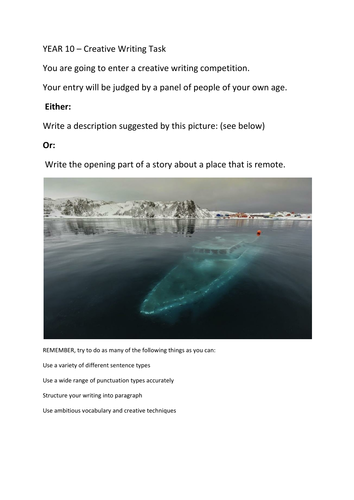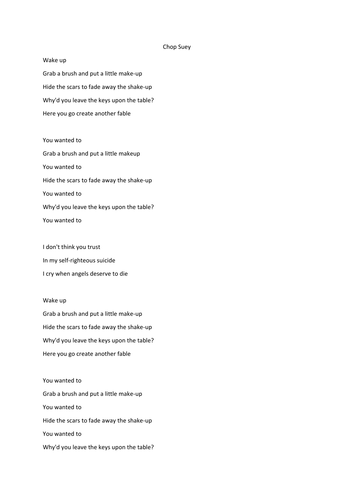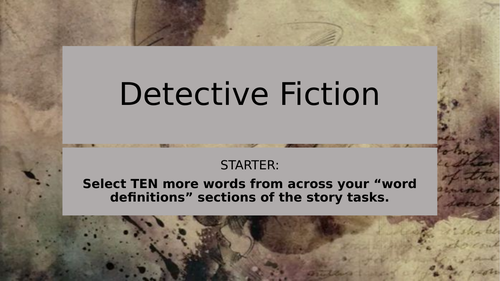
228Uploads
563k+Views
1397k+Downloads
English

AQA English Language and Literature A-Level: Foregrounding Heaney
A few elements of my class really struggled with this concept. So, I’ve broken it down into a step by step guide. The class will each need a copy of the AQA Poetry Anthology for this. It focuses on Follower first and then sets them up for an academic tilt at a comparative response.
I’ve had a good response from the elements of the class that initially struggled too.

AQA Power and Conflict Poetry True or False Statement Generator
A useful little resource that can be a starter/plenary element in your lessons. The spreadsheet generates ten randomly selected true or false statements from a bank of over 260. Each of the power and conflict poems is covered and there is the scope for you to add in your own or edit the statements that are there.
I released this to my year 11s as a revision tool and they found it very useful.
Additionally, I have included a blank copy of the spreadsheet so you can create your own ToF statement generator.

AQA Power and Conflict BATTLE CARDS
As part of my quest to engage students with the 15 Power and Conflict poems, I’ve come up with these Battle Cards. Essentially, the idea is to promote AO1 and AO2 related discussions that get the students to recall what they know about the poems they have been taught without having the actual poem in front of them.
The students “score” each of the poem against a number of POWER and CONFLICT related areas. This is recorded on an A5 sized BATTLE CARD where they can draw supporting images(good for recall) and identify methods, key quotations and themes.
The idea is for students to battle one another and use the cards as the stimulus point for the discussion. Whoever is best able to justify the score they have given for their card wins the round.
I’ve included a blank card along with 15 poem specific cards (each of these has a supporting back ground image, but is the same as the blank card in all other respects).

KS3: SPaG Understanding a Text Lessons (Using Michael Grant's "Gone" series as a stimulus)
SPAG lessons can get a little flat at times. These are the worksheets I’ve designed to use with my own SPAG group. It is designed to be taught in tandem with a Dystopian Fiction SoW that ends with a reading assessment. Specifically, these lessons focus on an extract taken from Michael Grant’s “Gone” - all extracts taken from the first chapter. The aim is to develop an increased understanding of each text through the asking of more and more complex questions. The tasks can be sat as part of a lesson (I reckon they’ll take most groups between 10-30 minutes depending on the groups setting), or make ideal homework and/or extension tasks.
At the moment, the resources are set up to be taught to lower set year 7 students. But, it won’t be too hard to change the tasks to more suitable ones for any set.
UPDATE: I’ve included some versions that are more suited to be printed out. They have some basic RAG feedback grids on the back with some generic targets.

AQA GCSE English Language Paper 1 Style Creative Writing Tasks
Three quick and easy tasks with supporting images. Ideal for quick and easy filler lesson, or as building into a larger scheme.

AQA A-Level English Language and Literature: Othello - Lesson 5-6 (The End and Exam strategy)
Two lessons this time, both very much reliant on the students to do the contributing: hence the reduced price.

Spell Quest - making spelling fun
A summer spent playing word games with my kids lead me to this idea.
The idea is that the students are supplied with a grid of letters. They use these letters to build words which cause damage to a cartoon monster. The bigger the word, the more damage done to the monster.
I’ve made it more and more difficult as the monsters develop - you have to use certain letter types for example.
I plan to give each child one grid per week to complete and have their peers mark it.
So you are completely aware, I have left all of the grids blank apart from on a few. You will need to fill these in yourself. Also, I have left the challenge component blank too. This will allow you to create challenges that reflect the specific types of spellings you are looking at - double damage awarded for homophones for example.
There’s massive scope for differentiation in here too. I’ve included a whole class version of the spelling levels, as well as a photocopy friendly version too.
I have long believed that making school a little more like computer games can be helpful - this is my first attempt at exploring Gamer Theory as I have dubbed it.
Watch this space for more. Have to figure out how to do something similar with the other components of SPAG and Reading now…
ADDITION: I’ve included some completed versions of the pack to give you an idea of what they could look like. Pay attention to the NOTES section of the power points too. These grids have been designed to be used in tandem with the Escape From Kraznir scheme of work.
ADDITION: I’ve also added a new powerpoint that works as a whole class exercise. You don’t need the sheets, just paper and the will to go on…

AQA English Literature: Introduction to Unseen Poetry lessons
Lessons designed to engage and interest my year 10s as they step into GCSE-land for the first time. They enjoyed the analysis of the song lyrics a lot.
I found that my previous classes found it very hard to engage with the poetry element. These lessons (combined with a couple of others that don't belong to me) worked well.

AQA A-Level English Language and Literature: Othello - Lesson 2 (Soliloquies)
My second lesson. Here, I focus almost entirely on ACT 2 SCENE 1 and Iago's soliloquies therein. The notes element of the power point pulls a lot of thinking together from across a lot of sources - you'll need these notes to flesh out the tasks. I tie it up with an exam style question at the end focusing on what we can infer about attitudes to women. Quite pleased with how this looks and how it goes.

AQA English Literature Data Collation Spreadsheet aka "The Machine"
Attached is a spreadsheet that does an awful lot of work for you. To summarise, it does the following:
Allows for easy collation of GCSE Literature marks on a paper by paper basis AND as a whole examination
Allows for easy identification of various student demagraphics - EAL, PP and so on
Allows you to measure progress against students best, average and last marks across both papers
Works out "how many marks" until you hit target grades for individual students
Colour codes grades and marks to allow for at a glance progress checks
Once you buy this spreadsheet, you will not need to get another LITERATURE spreadsheet. The document contains instructions as to how to update the spreadsheet.
Oh, and if you do get this, I suggest you LOCK the individual spreadsheets ASAP: the document is set up to allow you to do this and still enter the data, you just won't be able to accidentally delete any of the coding, thus removing any brain overloads that might ensue.
Happy spread-sheeting!

AQA English Language Data Collation Spreadsheet aka "The Machine"
Attached is a spreadsheet that does an awful lot of work for you. To summarise, it does the following:
Allows for easy collation of GCSE Language marks on a paper by paper basis AND as a whole examination
Allows for easy identification of various student demagraphics - EAL, PP and so on
Allows you to measure progress against students best, average and last marks across both papers
Works out "how many marks" until you hit target grades for individual students
Colour codes grades and marks to allow for at a glance progress checks
Once you buy this spreadsheet, you will not need to get another LANGUAGE spreadsheet. The document contains instructions on the ARRAY tab as to how to update .
Oh, and if you do get this, I suggest you LOCK the individual spreadsheets ASAP: the document is set up to allow you to do this and still enter the data, you just won't be able to accidentally delete any of the coding, thus removing any brain overloads that might ensue.
I am using this at my current school and there are several other schools who are using this system with good reports.
Happy spread-sheeting!
PS - Yes, there is a page that reads exactly the same but for a version that caters for the AQA Literature course. The spreadsheets are different. Here's the link/address to the LITERATURE version:
https://www.tes.com/teaching-resource/aqa-english-literature-data-collation-spreadsheet-aka-the-machine-11405407

AQA English Language PAPER 1 Creative Writing Tasks/Resources
Three slides on a power point that can easily be printed out and handed out as a task. Each slide gets progressively more complex. Each slide contains a choice of two tasks (one descriptive and one relating to the writing of a narrative), a punctuation related challenge, a content challenge and an organisational challenge.
Ran it with my year 11s yesterday and they found it very useful.
Oh yes! I have intentionally put one spelling/punctuation mistake on each slide with the idea that I award a housepoint to the first student that identified it. You’re welcome!

KS4 Creative Writing Pack - inspired by "Your Shoes"
I wrote these lessons a while ago, but I remember getting some positive responses to the story AND the creative writing tasks.
For this, you will need some of those old AQA anthologies (the one that came BEFORE Sunlight on the Grass) - one of the short stories was called "My Shoes". The content, for those who don't remember, is rather more orientated towards KS4 than KS3, but the creative writing that comes from this resonates with the kids I taught at the time.
Hopefully you'll find this useful.

AQA A-Level English Language and Literature: The Tollund Man
A lesson I put together to assist with the teaching of The Tollund Man. Pay attention to the notes element of the power point. I source a lot of information from a lot of different places here.
Also, the essay questions at the end tee up nicely into a lesson focusing on comparison.

KS3: Survival Reading Assessment
A series of lessons and resources designed for a top set year 8 class. The extracts are a mixture of fiction and non-fiction. The focus was to take a group of year 8 students who are used to using the PEE structure and get them to write a concept focused response. I’ve included the model responses we built as a class, as well as the model response the students were provided.

AQA English Language Paper 2 Section A Resource pack: Jack the Ripper vs Zodiac Killer
A set of resources designed to engage year 11s with English Language Paper 2 Section A. I shaped the lessons around the articles written surrounding the time of Jack the Ripper, and around an article published following the Zodiac Killer sending a letter to the San Fransisco Chronicle.
The class were fascinated by these articles - I had students independently going away and reading pre-19th century newspapers off their own backs! This will need to be taught delicately though - the content is graphic in nature, so be sure that your class has the necessary level of maturity to access this material without being distracted.

AQA English Literature: Macbeth
A collection of resources designed to support the teaching of Macbeth at GCSE level. The lessons assume that the class will be “acting” out the play, using the summary as a stimulus for the acting out element. I interspersed this acting with numerous directions to read the text aloud; overall, the students enjoyed this combination of normal language and Shakespearean.
It has always been my way to establish an initial understanding of a Shakespearean text before trying to wade through the language.
Hopefully, this will prove a useful starting point.

AQA A-Level English Language and Literature: Othello (Revision)
A stand alone lesson that assumes all participants have read and understood the text. I used it as a platform to show students what they needed to be revising. There is some focus on themes and a focus on an extract - both areas of which I use as a stimulus for class lead discussion. I finish with an exam based question - the focus is upon the characters that are manipulated, not the manipulator (just to keep them on their toes). Hope you find this useful.

KS3: Detective Fiction - Sherlock Holmes. Workbook included. Reading and Writing SoW.
A thoroughly enjoyable unit of work. Built around a work booklet and designed for that awkward half-term at the end of the year where you don’t want to give out new exercise books.
The workbook contains a copy of The Norwood Builder, comprehension questions and vocabulary list, as well as a variety of activities that focus (primarily) upon creative writing skills with some language and structure based tasks.
The lessons are designed to be used with the workbook.
NOTE: I may upload a slightly different workbook in the future, but I will leave the original on here.

AQA A-Level English Language and Literature: Othello - Lesson 4 (The Violence Within)
A thematic exploration of Violence within Othello - focusing specifically on Act 4. Also, the power point starts with a little revision of characters and quotations from across the play. I found this a fun lesson.




















